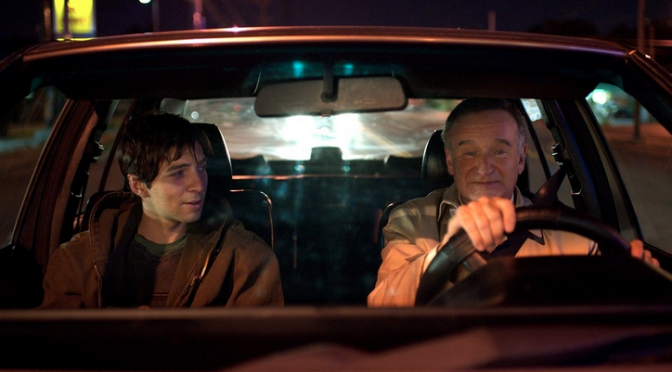As Robin Williams’ final movie, Boulevard is a difficult film to judge. Directed by Dito Montiel, best known for writing the memoir A Guide to Recognizing Your Saints and then adapting it for the screen, Boulevard tells the story of a lonely married man named Nolan Mack (Williams), who has always done the right thing and never tried to think twice about his own happiness. This is evidenced by a sad exchange with his boss, who asks, “Are you happy?” to which Nolan resignedly replies, “I guess as much as anyone, you know.”
Considering Williams’ own depression at the time of the making of this film, it’s easy to see why he would identify with a character so imbued with an aura of melancholy and regret. The impending death of his father and recent death of his mother merely add to the lugubriousness emanating from his being. One night, after his father has a near death scare, Nolan encounters a younger man walking the streets of Hollywood and almost runs him over in his distracted haze. Concerned over his well-being, Nolan stops the guy and insists, “I have this fear of hurting people.”
Intrigued by his obsequiousness, Leo (Roberto Aguire), as we later learn his name is), approaches Nolan’s car and says, “You wanna give me a ride?” Acting naive at first, Nolan can’t ignore that Leo is a hustler, yet still agrees to go to a motel with him where they talk (mostly Nolan) and tell one another personal details about their lives. From this night forward, it is as though Nolan comes to life, finally realizing something fully about himself that he could never acknowledge.
His wife, Joy (Kathy Baker), begins to notice his late hours and catches him in a lie about his whereabouts. Nonetheless, she chooses to ignore the obvious problem in their relationship (they’ve been sleeping in separate beds for the duration of their marriage) and instead continues to bother him about going on a cruise together–an idea largely inspired by Nolan’s best friend, Winston (Bob Odenkirk), a professor who dates younger women and takes liberal vacation time. Winston is, in fact, one of the only people Nolan is honest with, but has never told him the secret that has plagued him all his life.
As for Williams’ performance, it proves to be one of the more enjoyable elements of Boulevard, paired with the seedy, depressing backdrop of L.A. (Nolan works in a strip mall bank). The one glaring defect is that Nolan would find it so difficult to come out earlier on in life. Moreover, the entire “coming out” genre is still so new in cinema that it has yet to fully establish itself in a manner that doesn’t reek of the overly trite.
Apart from this, Boulevard proves itself to be a film more than worthy of Williams’ final onscreen appearance, showcasing his dramatic range and nuance as an actor.





















